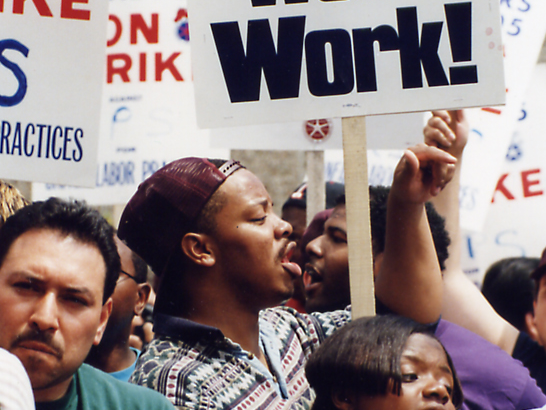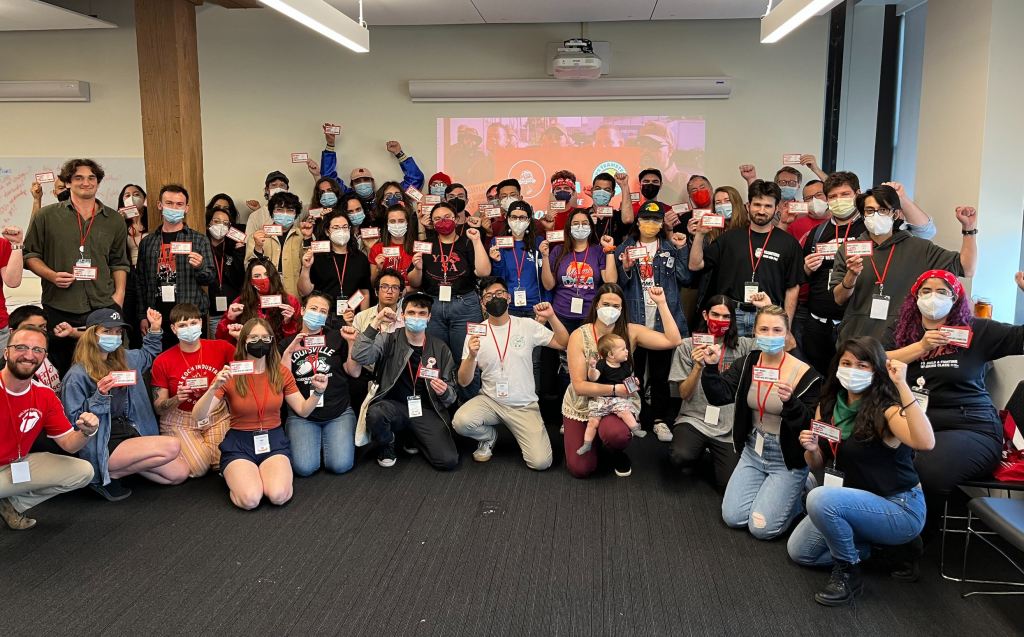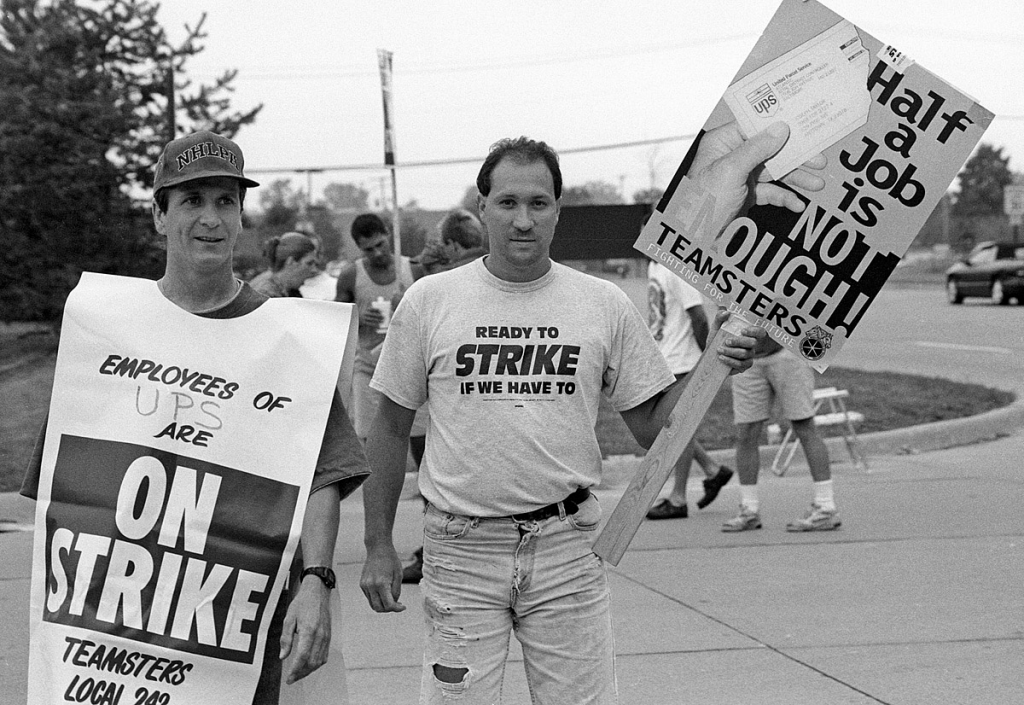

The DSA and Organized Labor
Member Bruce Nissen shares his thoughts on our work with the labor movement
One of the more “foundational stances” of the DSA is support for organized labor. Both in written positions and (less consistently) in practice, the DSA positions itself as unequivocally a pro-labor organization. Some DSA chapters have no working relationship with unions beyond rhetorical support; others like the Pinellas DSA have some of our members actively involved in individual unions and in broader union formations like the local central labor council (CLC).

It is not hard to understand why the DSA has this pro-union orientation. Democratic Socialists believe in democracy and favor struggle with our 1% overlords, the capitalists. Unions are among the most important U.S. forces for democracy. Although they do not have the clout with elected officials that corporations do, unions nevertheless have much more influence than almost any left-wing organization, so their support for basic democracy is important. The unions consistently oppose attempts (usually by Republican lawmakers) to restrict the franchise, make it harder to vote, implement right-wing populist or fascistic measures, or cut back the influence of ordinary Americans by any other means. Research has shown that countries with higher union densities are more equal and more democratic than those with low union densities.
By their very nature unions are also adversaries of large corporations and capitalists. This is simply because bargaining and enforcing a collective bargaining agreement with an employer brings opposing economic interests into contention, at least to a degree.
Therefore, a strong alliance between Democratic Socialists and labor unions seems like a clear plus. That said, socialists often find practical limitations to their work in the labor movement. One stems from the Cold War legacy. Many Americans equate socialism with dictatorship and loss of freedoms for individual workers and their families. Nationally prominent Democratic Socialists like Bernie Sanders or Alexandria Ocasio-Cortez (AOC) counter this image, especially among younger workers. DSA member behavior within the labor movement also dispels this misconception. I expect this obstacle to diminish over time.
Nevertheless, young DSA members who join and get involved in unions are frequently confounded. This is part of a pattern of American workers in generally often not understanding what unions are or how they work. A young DSA member first thinking about involvement in a union at their workplace may expect to see a dynamic organization on the move; what they often find is a bureaucratic, uninvolving outfit with few interests beyond protecting the contractual protections of its own members and few external activities beyond supporting Democratic Party candidates irrespective of how progressive those candidates are or are not. (Of course, this is not an accurate depiction of all unions — some are dynamic, progressive, internally democratic and involving — but these are the exceptions to the rule in today’s American labor movement.)
Given this “state of the unions,” some young DSAers may ask, “Why is it worthwhile to involve oneself actively in union or labor movement affairs? Isn’t it mostly a waste of time that would be better spent elsewhere?” I think this question deserves a serious answer.
The labor movement must be at or near the center of our focus because unions are the only institutions of any size in American society that are composed entirely of workers and are devoted entirely to the interests of workers. They are unique working-class institutions in a society that has attempted to obliterate even the notion of “working class” by lumping us all into a broad “middle class.” With all their flaws, unions are the only organizations we’ve got if we want to reach workers on a self-organized basis. And reaching workers on a self-organized basis I so crucial because working class people asserting themselves at the workplace (the “point of production”) is the only way that transformative change occurs, and historically this is the only way it has ever happened.
To illustrate this, consider the difference between putting our socialist energies into union work vs. putting them into a party like the Democratic Party. In the labor movement, you are working to build and contest politically within a clearly working-class institution that, however backward its leadership may be, is still at its core an organization composed of and answerable to workers. In the Democratic Party, you are working in a multi-class institution largely funded by and certainly answerable to a core of multi-millionaires and billionaires. Even if the political perspectives coming out of the leadership of both institutions should be identical there still would be a world of difference concerning which is worth serious socialist engagement.
To me, that means that we Democratic Socialists should view the Democratic Party in a totally opportunistic fashion: use it when you can (for example, use its ballot line in most cases) and soak it for support whenever that’s possible for our objectives and candidates, but don’t waste your time trying to internally build this organization that has no clear class basis and no internal discipline except for the discipline exerted by its funders. In contrast we should view the labor movement as fertile terrain for serious involvement and contestation over political and organizing/mobilizing orientation. We have a strong foothold for building class power to the extent that we are able to establish socialist influence and ultimately leadership within it. That means we have to build the labor movement; help it to thrive and then work to make it a better instrument to enhance the power of all workers.
That’s why I believe that an unshakable commitment to the labor movement and to establish and build a socialist current and ultimately socialist leadership within it to be absolutely crucial to the work of the DSA. Given the political and bureaucratic outlook of many labor leaders, that may seem a discouraging prospect but there is no alternative. The members of U.S. unions are much like other workers in our country, and we can’t expect unions to magically be way more advanced than their own membership. Building a socialist working class and ultimately a socialist America is a long-term task — work in the labor movement is crucial, but we must think of ourselves as long-distance runners.
(I want to thank Richie Floyd for incisive commentary on an earlier version of this blog, helping me to make it much better.)


ALCU, NJWFP, & Fair Share Housing among 9 endorsing Jersey City right to counsel
The state chapter of the ACLU, the New Jersey Working Families Party, and the Fair Share Housing Center are among nine endorsing the right to counsel proposal in Jersey City.
The other groups lending their endorsement to the cause are the Latino Action Network (LAN), Housing Rights Initiative (HRI), Make the Road New Jersey (MRNJ), Our Revolution New Jersey, North New Jersey Chapter of the Democratic Socialists of America (NNJDSA), and the New Jersey Policy Perspective (NJPP).


Right-to-counsel laws proven to aid tenants, communities | Opinion
A response to “Jersey City’s eviction proposal will help lawyers but not solve the real problem | Opinion” by Wendy Paul, Executive Director of the Apartment Owners Association:
“…let’s lay out what Paul’s op-ed forgot to mention: Dozens of studies have shown that Right to Counsel is an effective, moral and cost-saving solution to the housing crisis across the country. In New York City, before RTC was passed, only 1% of tenants had representation in landlord-tenant court, while 95% of landlords were represented. Now, 56% of all tenants are represented…in NYC, 84% of all tenants who were provided an RTC attorney remained in their homes.”
Read “Right-to-counsel laws proven to aid tenants, communities | Opinion” in the Jersey Journal


The invisible and ignored struggles of Princeton’s service workers
Published in The Daily Princetonian.
The following testimonial comes directly from a service worker at Princeton University, presenting an authentic sentiment of inadequate financial support and an uncaring institution; it is just one of many voices of frustration and despair on this campus. It has only been edited for clarity:
“My salary is not enough for a single father with two kids. I can not afford to [pay for] rent and utilities, [not to mention] car fuel and maintenance… I literally have to choose if I’m going to have breakfast or lunch most days ’cause the price of food is high and I can’t afford to eat both meals most days… I’m asked by office staff if I have plans for a summer vacation; I can’t even treat myself to McDonald’s, so a vacation is just a dream. The small 2% or 3% raises we get are always erased [by] the annual 3% raise we pay for health insurance. I have been working for Princeton for a little over 3 years, and my salary has gone up by less than 800 dollars for the year… I left a job that paid me significantly more, but I couldn’t pass up the chance to work for what I thought at the time was a world-class university. I have come to realize that it’s smoke and mirrors and Princeton wants to pay us middle to low-end of the scale and expect to be talked about in the same breath as Harvard, [but] Harvard facilities operations [get] paid higher [than] we do here. So maybe Princeton should lower their view of [themselves] until they truly start acting like the prestigious university that they are.”
Our service workers are vital to the University community, yet paradoxically exist in a space disparate from it: a space in which their concerns and fears aren’t important enough for the University to accommodate them. While the University offers legitimately helpful benefits including healthcare, childcare, and retirement funds, which are genuinely appreciated by workers, a survey of over 100 union workers on campus – conducted by Princeton YDSA – tells us that they are simply not enough. Instead, the ostensibly meaningful benefits mask the impacts of low wages on those that need to pay for rent, a car, or even just food for their kids.
While the University helps faculty and students thrive, workers are left to the wayside – as one campus worker described, the administration “doesn’t really care what we are facing on [a] daily basis.” Princeton should no longer brush these issues aside. It must take these concerns seriously and commit to supporting its service workers with meaningful compensation.
While the cost of living has increased month over month all across America for the past two years, many Americans have felt left behind by the corporations that employ them. These employers have offered meager raises to pacify their workers while annual costs of living have skyrocketed by 8 percent and even 12 percent in some states, and many corporations are raking in record profits in an economy that is failing to support its essential workers.
Princeton, disappointingly, is following these trends. According to the survey, despite requests from workers to be fairly compensated under the cost of living increases in New Jersey (which stand around 8 percent, Princeton acts as if circumstances have not changed, offering minimum pay increases below inflation and the cost of their benefits to unionized workers. In other words, our employees are effectively seeing their wages decline.
In the survey, workers detailed the extent of the deep financial issues they face which Princeton must make an effort to remedy. Many of the responses mentioned general cost of living hardships in New Jersey and Princeton saying, “fuel cost + mortgage / rent is unattainable for my union brothers / sisters,” “I have problems paying my bills and paying for food,” and “I can’t afford anything but the bare minimum.” Cost of living increases along with Princeton’s disgracefully low wages have created unacceptable conditions for many of our most valuable and essential workers. However, beyond these already appalling day-to-day living situations, some workers described absolutely devastating stories due to the lack of financial support from Princeton. Among the most heartbreaking comes from a worker who was forced to sell his home to afford rising expenses: “[I had] to sell my home. Everything is so expensive for everyone; a big increase should [have] happened long ago for us [essential] workers.”
The lack of essential cost-of-living adjustments is made more devastating by the cost of Princeton’s healthcare benefits. Despite receiving praise from many workers in the survey, many also criticized the fact that unionized employees’ negotiated annual raises (around 3 percent) are almost entirely negated by the rise in healthcare costs each year (also around 3 percent) — even before inflation. Princeton’s pay stagnation shows a blatant disregard for the deplorable conditions that their essential workers live in — conditions that are in direct contrast to Princeton’s status as the wealthiest per-capita university in the U.S.
Princeton must give its workers automatic, meaningful increases in wages that account for changes in the cost of living. Responding to our survey, 105 out of 116 workers said that they would “support automatic cost of living adjustments” as a baseline policy. In responses that provided more detail, many mentioned a desire for financial security and fair compensation. “Our current raises hardly even keep up with yearly increases in health care let alone everyday cost of living increases,” noted one worker. Another asserted: “We all deserve more than just a cost of living raise.” Yet given Vice President of Human Resources Romy Riddick’s claim that Princeton is “paying very close attention to the salaries and making market adjustments,” it is evident that Princeton only cares about the market viability of its wages, not the needs of its workers.
Given Princeton’s current indifference to these conditions, students must play an active role in pressuring the University to make real changes — most importantly, annual wage increases across the board for its workers to combat the rising cost of living. Students’ voices can genuinely influence the actions of the administration. Look to the incredible efforts of Divest Princeton, for instance, and their resilient campaign that resulted in the University divesting its endowment from publicly traded fossil fuel companies Their work is far from over, however, and so is ours. We encourage students to advocate on behalf of workers who have found their struggles invisible to and ignored by Princeton. Join us in our fight against the University’s negligence for our most essential workers to live a life free from immense and unnecessary turmoil and hardship.
To help us advocate for this vital change, we encourage you to sign on to student groups’ petition for the University to address campus workers’ needs. Also, please join us on May 1st as part of the Unidad Latina en Acción (ULA) May Day March for International Workers Day as we amplify workers’ grievances. The march begins at 112 Witherspoon Street on May 1 at 6:00pm and will feature speakers from YDSA, ULA, and other groups advocating for workers’ rights and empowerment.
Additionally, fighting on the side of Princeton’s campus workers in their attempt to receive fair and livable compensation is their local union, Local 175 of Service Workers International Union (SEIU). Made up of our indispensable workers (staff from dining halls, cleaning, maintenance, etc.), SEIU 175 is urging the University to better pay its workers. However, effectively utilizing the union to advocate on behalf of workers turns out to be quite difficult at Princeton, given their “no-strike” clause in the negotiated contract, as Bryce Springfield ’25 and Lucy Armengol ’26 argue in another piece.
David Beeson ’26 and Abdul-Bassit Fijabi ’24 are members of Young Democratic Socialists of America at Princeton. The views expressed here do not necessarily reflect those of SEIU 175. This article was written alongside another in a series on campus labor.


By restricting strikes, Princeton silences workers’ free speech
Published in The Daily Princetonian.
Free speech is understood to be a central tenet of academic life at Princeton. Members of the University across the political spectrum have considered how free speech can and should be upheld on campus while maintaining a safe environment. But these conversations have failed to include an essential part of our campus community: workers. Until the University removes the ban on worker strikes, its commitment to free speech will remain hollow.
Members of the Service Employee International Union (SEIU) Local 175 (a union on campus that includes dining hall, custodial, and landscaping staff, among others) are unable to fully access their right to free speech. Workplace discussions about organizing are limited, and their freedom of expression is sharply restricted as well. Article 35 of their contract with the University prohibits the Union and employees from participating in “any strike, sympathy strike, work stoppage, concentrated slowdown, refusal to cross any picket line or interrupt work in any other way.”
Article 35 is justified under the University’s Statement on Freedom of Expression, which protects free speech unless it is “directly incompatible with the functioning of the University.” The University’s statement claims this is a “narrow exception to the general principle of freedom of expression.” However, strikes are one of the most meaningful and impactful practices of free speech.
Free speech has played a vital role in unionization and workers’ rights movements. In the early 20th century, the Industrial Workers of the World (IWW), an organization that advocated for workplace democracy through general and industrial unionism, engaged in a series of “free speech fights.” Members of the IWW spoke out and organized strikes across the United States, often resulting in their arrest. Many organizers refused to be released from prison and demanded a trial as a platform to advocate for both free speech and the right to strike and unionize.
Working conditions improved during the Progressive Era as the federal government was forced to make concessions to labor organizations in the face of strikes and other forms of union activism. For example, in the Bread and Roses Strike of 1912, mill workers who were predominantly immigrant women went on strike in Lawrence, Massachusetts, after their wages were decreased. 23,000 workers went on strike and almost 20,000 were on the picket line. Ultimately, the Bread and Roses Strike increased not only their own wages, but the wages of textile workers across New England.
Labor activism has played a critical role in achieving many of the labor protections which we take for granted, including weekends, overtime pay, and the elimination of child labor. Without the ability to strike, SEIU Local 175 is significantly disempowered in their contract negotiations with the University.
To investigate the state of worker satisfaction on campus, the Young Democratic Socialists of America (YDSA) at Princeton surveyed 116 union service workers during the Spring 2023 semester. On one hand, the survey found that most workers seemed grateful that the University offered relatively good non-wage benefits. However, as expressed by Abdul-Bassit Fijabi ‘24 and David Beeson ‘26 in a separate piece, surveyed workers have consistently expressed concerns; for example, some noted that they are woefully underpaid – especially in a time of high inflation – as staffing shortages and a sense of alienation plague many union shops on campus.
SEIU Local 175, which employs over 700 employees at Princeton University, makes active efforts to improve working conditions and wages for unionized workers. As one worker expressed, the union “[f]ights for all employees and has… sav[ed] employees’ jobs”; and as another notes, the union has “done well with getting us increased raise amounts over the past couple years.”
Yet, these aims are severely limited by the imbalance of power in the contract negotiations between the University and the Union, particularly when the University bans free expression in the form of a strike.
In the United States overall, unions consistently demonstrate strong benefits for workers, including up to a 20 percent income premium compared to similar non-union workers. Unions, moreover, demonstrate comparable lifetime earnings gains to those of a college degree despite earlier retirement, with a major part of the causal mechanism being the strike. As demonstrated by economist David Card, strikes in the US have historically had significantly positive effects on unionized workers’ wages, and such strikes were deeply intertwined with empowered labor unions.
Within the University of California system, this freedom of expression enabled educators to gain substantial improvements to students’ education quality and their workplace conditions, with 48 percent higher minimum wages for teaching assistants and 61 percent for graduate students. In 2022, even the mere threat of a strike among Kaiser Permanente nurses resulted in major improvements for both workers and patients, with 22.5 percent higher pay and improved staffing to provide improved patient care. More recently, though the fight continues, the Rutgers strike enabled faculty and graduate students to make strong gains, including 14 to 44 percent higher wages, after the Rutgers University administration simply refused to make reasonable concessions for its employees to see decent compensation for their contributions, by extension ensuring that educators can better serve their mentees.
With the no-strike clause in Article 35, SEIU Local 175 and the workers it represents have less power in their negotiations with the University, as they lack one of the most “powerful tool[s] for any union [to] express its voice,” as put by an anonymous employee. If the University disagrees with a demand, the union cannot effectively use its leverage to encourage the University to listen to workers.
This unconscionable restriction sharply contradicts the University’s romanticized rhetoric about its free speech policies, preventing workers from freely expressing themselves. Free speech is an essential value that must be accessible to everyone, including workers and including for expression that challenges Princeton University, if it is to truly value free expression. Even some past Supreme Court rulings have protected the right to strike on the grounds of protecting workers’ freedom of expression, such as Thornhill v. Alabama (1940) and NLRB v. Washington Aluminum Co. (1962).
Although workers are severely limited in the extent of free expression permitted by the University, students do have the ability to platform the unheard grievances of workers. By acting in solidarity with the employees who sustain our education and living as students, we can show that students will not accept the University’s neglect and disrespect of workers’ needs and free speech principles.
We encourage you to sign on to student groups’ petition for the University to address campus workers’ needs. Additionally, please join YDSA on May 1st to amplify workers’ grievances as a part of Unidad Latina en Acción’s May Day Rally, starting at 112 Witherspoon St on May 1 at 6:00 pm.
Lucía Armengol ‘26 and Bryce Springfield ‘25 are members of Young Democratic Socialists of America at Princeton. The views expressed here do not necessarily reflect those of SEIU 175. This article was written alongside another in a series on campus labor.


New Jersey Workers and Tenants Fighting Back
We're crossing the Hudson River once again to speak to our socialist comrades fighting for workers’ and tenants’ rights in New Jersey. We’ll hear live from Isaac and Julia of the Right to Counsel campaign in Jersey City, now the priciest city in the nation, on their organizing to guarantee representation from an attorney for all tenants facing evictions and other housing issues. We also speak to Deepti, an undergraduate student at Rutgers University, and Sarah, a member of the grad union’s bargaining committee, on their recent and historic strike and what’s next for workers at the largest university in New Jersey.
To learn more and get involved with the Right to Counsel campaign in Jersey City, visit righttocounseljc.org.
Follow Rutgers AAUP-AFT at @ruaaup and Rutgers One Coalition at @r1coalition.


May 6, 2023 Voter Guide
There are two San Antonio DSA endorsed candidates on this guide and one proposition: Jalen McKee-Rodriguez in City Council District 2, Teri Castillo in City Council District 5, Prop A: San Antonio Justice Charter.
Candidates/propositions must seek the endorsement of SADSA and our general membership votes on the decision to endorse. Several community members have reached out to SADSA for a voter guide, so we have created one. It is by no means expansive and does not cover every race in our area, but we hope this can help inform your decisions if you’re looking to a socialist organization for electoral advice.
Our struggles go beyond the ballot box, but it is a site of struggle that we cannot withdraw from, we can take it back if we fight together. Join San Antonio DSA.
If you have any questions or comments, please don’t email SanAntonioDSA@gmail.com.
In Bexar Co. you can vote at any voting location. You can go to the Bexar Co. Elections Department website to find voting locations, hours, your individual sample ballot and more.
City Council Landscape
It’s true the highs of 2021 have worn off. No matter how you slice it, City Council will be lurching to the right for the next two years. The 2023-2025 City Council will still be made of mostly centrists, but things just feel worse this time around. This Council has made historic investments though American Rescue Plan Act (ARPA) decisions, Inflation Reduction Act (IRA) and Bipartisan Infrastructure Law (BIL) funding, and the largest municipal bond in history, but the vibes are most certainly fucked.
There are a few bright spots in union and tenant organizing, but efforts desperately need to be ramped up to exert political pressure before monumental races in 2025. Alongside an open mayoral election, District 4, District 6, District 8 and District 9 will likely be open, if Councilmember Courage (D9) can secure a fourth term this year. The 2025 races will be on the heels of what will certainly be a very entertaining, and likely devastating, Presidential cycle that will most definitely change organizing landscape and conditions.
We sincerely hope that no matter what happens on May 6th and over the next two years, you’ll commit to joining an organization (hopefully DSA dsausa.org/join) and start organizing. Regardless of where you see yourself “on the Left,” your politics are assuredly not reflected across local elected offices…but they should be, even a glimpse! Our Voters Guide is admittedly a bit bleak, no candidates aside from our endorsed candidates are receiving a recommendation before the runoff. We understand this might not really help people who want to vote, but don’t know for whomst. Unfortunately, the who this cycle is mostly anti-Prop A, Chambers of Commerce-types who all say generally the same thing. A total lack of political imagination fueled by a void of community organizing, being filled by (hopeful) careerist politicians. Two years ago, we fought to get Teri and Jalen elected to City Council. This year, we will make sure they stay, and two years from now we must get them comrades on Council.
Organize where you work, organize where you live, and let's organize for a better San Antonio.

UPS Teamsters Gear up for the Contract Fight of a Lifetime

Many of us frequently interact with United Parcel Service (UPS) workers in our daily lives. You see them driving down your street in their emblematic brown trucks. You count on them to deliver birthday gifts to far-flung family members. You may even chit-chat with the UPS worker who regularly delivers packages to your door. UPS is the third largest company headquartered in Atlanta, and it employs nearly 400,000 essential workers who are responsible for transporting 25 million packages and documents daily, across 220 different countries and territories. Millions of us rely on the hard work of UPS drivers and warehouse workers. But did you know that these workers are currently gearing up for a critical contract fight to win better wages, hours, and respect on the job?
All 350,000 non-management UPS workers throughout the U.S. are covered under a national contract, known as the National Master Agreement (NMA), that the International Brotherhood of Teamsters (IBT) has with UPS. This contract governs their wages and working conditions. Some UPS workers — but not all! — are also covered by a local “supplement,” which is a second contract negotiated by local or regional bargaining committees that often has stronger language than the NMA. So while all UPS Teamsters have some baseline protections, there is a lot of variation in the level of protection members receive depending on location. That’s why it’s crucial to have a strong NMA.
And guess what? The NMA is currently up for renegotiation, which is a huge opportunity for UPS Teamsters trying to strengthen their contract. It will expire in just a few months, on July 31, 2023. This time around, IBT is being led by a newly-elected coalition of militant reformers, including General President Sean O’Brien. They’re done making concessions, and if UPS does not end two-tier driver jobs, raise pay for part-time workers, and give in on other key issues, the UPS Teamsters plan to strike nationwide on August 1, 2023.

DSA is ready to go all in on this fight! Last weekend, DSA labor and electoral organizers from all over the country gathered in Chicago to announce that 71 and counting DSA electeds have signed on to support the UPS Teamsters this summer. Ahead of July 31, we’re gathering the support of members, our coworkers, and the larger community to stand with UPS Teamsters on the picket line when the time comes. We’re counting on YOU to get involved, sign the pledge, and take a moment to learn what this struggle is all about!
When was the last UPS Strike?

The last UPS Teamsters strike took place in August 1997, during which 185,000 UPS workers went on strike for a better contract. This was a pivotal moment for the U.S. labor movement. The strike lasted 15 days and cost UPS hundreds of millions of dollars. The company admitted that fears of even bigger losses led them to finally agree to IBT’s demands. In other words, the Teamsters showed their company and the world that, when well-organized and well-supported, workers hold the power. IBT won pay increases for part-time workers and drivers, secure pension plans and increased benefits, the conversion of 10,000 part-time jobs into full-time ones, and more.
Strikes have always played a vital role in the American labor movement, but striking actions have declined greatly in this country over the last four decades. Data from The Bureau of Labor Statistics shows that 1,796,000 workers were involved in major work stoppages in 1974. That number hit a low in 2009 with just 12,500 workers participating in major work stoppages. Major strike activity saw a 35-year high in 2018 and 2019, according to Economic Policy Institute. Most recently, in 2022, 120,600 workers were involved in 23 major work stoppages, which was a nearly 50% increase from 2021. Though striking is becoming more popular and union approval rates are increasing in the U.S., UPS hasn’t dealt with a strike in over 20 years. The company is likely unprepared, but the Teamsters aren’t. IBT is ready to stand firm on its demands.
Teamsters’ Contract Demands for UPS Workers
As members of DSA and the Atlanta community gear up to support UPS Teamsters in their contract fight, it’s important to know what workers are fighting for so we can uplift their demands and spread the word! Here are a few of the most urgent issues that will decide if the Teamsters launch the largest strike in recent American history and why each demand is meaningful.
No more two-tiered driver classifications
The 22.4 full-time worker tier was created by the IBT’s 2018 contract with UPS, which was negotiated by former IBT General President and business unionist, James Hoffa Jr. This tier is made up of mostly new drivers who do the same work as more senior drivers — classified as regular full-time package car drivers (RPCD). RPCD pay tops out at $41 per hour, but 22.4’s pay ceiling is $6 per hour less. In addition to lower pay, 22.4s have much less control over their schedules than RPCDs, which leads to high turnover rates. 22.4 drivers deserve the same pay and protections as RPCDs.
Higher pay for part-time workers
Despite what you may assume based on how often you see UPS drivers out and about, most Teamsters at UPS are not drivers. Over half work inside distribution facilities, and many of those workers are part-time. These part-time workers play a vital role in making sure UPS runs smoothly, and they deserve to be compensated fairly for their significant contributions. Starting part-time pay must be increased to above $20 an hour and catch-up raises must be given to existing part-time employees.

UPS must also end its use of Market Rate Adjustment pay discrimination against part-time workers. MRAs can take the form of hourly rate increases or weekly bonuses and can cover a whole geographic area, a single center, or just certain shifts. By using MRAs, UPS has raised the wages of some workers without implementing raises across the board. The use of MRAs divides unions by pitting senior workers against new hires and even members at one building against another.
More full-time jobs
UPS needs to create more full-time 22.3 jobs, which are inside jobs doing tasks like sorting packages, loading and unloading semi-trucks, and more for 8 or more hours a day. The many part-time workers who are so critical to how UPS runs should be afforded more opportunities for reliable, full-time work if they want it.
No more excessive overtime
Package drivers need stronger 9.5 rights, or the right to cap work at 9.5 hours, three times a week. All people deserve a life outside of work. At UPS, however, employees are often forced into working six days a week. Workers refer to this as the forced 6th punch. Workers who want overtime hours and pay should have the choice to pursue that, but it should be just that — a choice.
Job security for feeders and package drivers
Feeder drivers are usually workers who drive semi-trucks from warehouse to warehouse. UPS sometimes diverts this feeder work to nonunion carriers. It’s time to put an end to the subcontracting of feeder work.
There must also be stronger protection for the jobs that are being eliminated by Access Point and Surepost. Access Points are local businesses that serve as drop-off and pick-up locations for people sending or receiving items through UPS. The company utilizes Access Point as a tactic to cut costs. Surepost is an economy service offered by UPS that delivers items through the USPS. Both render UPS drivers unnecessary, which cuts back on potential jobs.
Video camera and harassment protection
In recent months, there has been a push from UPS to install driver-facing cameras inside vehicles. The introduction of surveillance systems is made even more egregious by the fact that many company vehicles are not even properly outfitted with air conditioning, which has led to hospitalizations for drivers, and in one case, even death. Stronger language to protect workers from this kind of company harassment — including financial penalties against UPS for any violations — must be put in place.
Why Atlanta DSA stands with UPS Teamsters
As socialists, we’re committed to standing with the UPS Teamsters every step along the way of their contract battle because we believe that building power in the workplace is essential to building a better, more democratic economy and society for all working people. The entire working class must stand together with rank-and-file UPS Teamsters in this historic fight to show large corporations like UPS that when workers overcome divisions and unite as a class, we win!
As this is the largest private sector contract in the nation, IBT’s upcoming fight is sure to have a ripple effect in union organizing across the country. Workers make up the majority of the population and create all value in society, but in the U.S., we are highly unorganized with only 11% of U.S. workers represented by a union. To ensure the momentum continues, we should bring everyone into this campaign and work to elevate workers’ demand in a way that helps grow class consciousness among all workers. This campaign is a crucial opportunity to win not just a great, hard-earned contract for UPS workers nationwide, but to send a message to the working class: strikes get the goods! If UPS refuses to concede to workers’ demands and they decide to strike, workers far and wide will see in real-time the power they hold.
How to support UPS Workers
Just like the Teamsters, DSA is asking members and supporters to get STRIKE READY! Sign the Strike Ready pledge and commit to standing in solidarity with IBT UPS workers this summer as they prepare for the biggest potential strike this country has seen in decades. Get updates on upcoming #StrikeReady events this summer, including educational panels, picket line trainings, rallies, and phone banks. Plus, check out the information we’ve put together on the contract fight at atldsa.org/ups-solidarity.
Talk to your union members, coworkers, friends, family, and neighbors about the potential strike! Get them to sign the pledge, attend a phone bank, or join you on the picket line in August. When the working class stands together to fight, we win!
After you’ve committed to join striking workers on the picket line this summer, make sure to brush up on DSA’s Picket Line Do’s and Don’t’s to be prepared and helpful during the strike!
Finally, to get involved in DSA’s strike solidarity and labor organizing work, get plugged in with our Labor Committee by emailing labor@atldsa.org.
The post UPS Teamsters Gear up for the Contract Fight of a Lifetime appeared first on Red Clay Comrade.


Organizing in the belly of the beast with New York State Legislative Workers United
The New York State budget is now 18 days late and while the media focuses on the horse trading going on between Governor Hochul and Senate and Assembly leadership behind closed doors in Albany, there are of course, as there always are, workers keeping everything running behind the scenes.
Tonight we’re joined live by two of those legislative staffers, Astrid and John. We’ll talk to them about New York State Legislative Workers United - an effort to unionize and improve working conditions for legislative staffers across the state.
You can follow New York State Legislative Workers United on Twitter at https://twitter.com/NYSLWU


Denver DSA HJC Land Use Bill Statement
A major housing bill is making its way through the Colorado legislature, SB23-213 – referred to as ‘land use’ – has driven much of the recent discussion over state housing policy. The bill, among other things, would enable greater housing density in municipalities around Colorado by compelling municipalities to change their land use regulations. In many cities, including Denver, it would effectively end single-family zoning and allow multiple units (currently up to 4) to be built on lots previously zoned for only one unit.
This legislation has much to like. Exclusionary and restrictive land use policy has made our housing and environmental crises worse, and it is important to use state power to break down this land use status quo. The rules to change occupancy limits are welcome, as are water audits, reforms to HOAs, and reduced parking requirements. We also recognize the importance of encouraging development patterns that are environmentally sustainable, promote housing density, and push cities away from suburban sprawl. We know that the status quo of single family zoning primarily serves to protect the interests of wealth and property values, not the interests of tenants. We do need more housing, and ultimately, housing for all. While this bill can inch us closer to housing for all, it is only one piece of a much larger puzzle.
Denver DSA’s support for SB23-213 is conditional. We demand that this land use bill passes together with two other critical housing bills: local control of rents (HB23-1115), which would enable municipalities in Colorado to enact rent control (aka local control of rents), and just cause eviction protections (HB23-1171). These bills are absolutely essential to defending tenants at a time of ever-increasing housing instability and exploitation from landlords.
Through this legislative session, we have seen attention and support diverted away from these bills and towards land use, leading to a situation in which land use is upheld as a magic bullet for the state’s housing crisis. We reject this framing and demand that land use is passed together with local control of rents and just cause eviction protections. Otherwise, lawmakers are abandoning the immediate needs of tenants and instead opting for a legislative track that avoids direct confrontation with capital – namely the developer and landlord interests that wield substantial power over Colorado’s politics and that are invested in policy “solutions” to our housing crisis that prioritize their profits, not the needs of tenants. This imbalance of legislative attention, typical in prior sessions, is unsustainable in a context where renters are more cost burdened than ever while owners reap record profits.
This legislation could very well be beneficial to our state in the long run. However, we have to temper our expectations for what it can achieve. We can’t rely on market-rate housing to solve our housing crisis. Moreover, the slogan of this bill, “More Housing Now” is misleading, as it will take many years, if not decades, for a significant amount of new housing to be built as a result of these policy changes to land use law. Without other major efforts to transform our housing system, including social housing, rent control, community land trusts, robust tenant protections, metro district reform, and tenant organizing — many tenants will continue to find themselves living in unstable, exploitative housing arrangements, and housing will continue to be financially out of reach for working people in our state. We are ultimately fighting for a transformation of our housing system to one in which enough housing is under democratic and community control to make housing a basic human right. It is imperative that we struggle for this transformation and build tenant power in all of our organizing and policy efforts. The land use bill does not, in any meaningful way, alleviate the necessity and urgency of this struggle.
Land Use Reform is a good step, but its benefits are contingent on choices beyond the bill itself. 213 will not meaningfully address our housing crisis on its own, and must be implemented in conjunction with legislation that enables cities to pass rent control and just cause eviction protections, and must be amended to protect against displacement. Otherwise, we are continuing to neglect tenants and are missing an opportunity to bring about the fundamental changes that we so urgently need in our housing system.